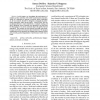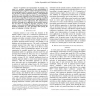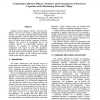1756 search results - page 189 / 352 » On Cognitive Interference Networks |
SPEECH
2010
14 years 5 months ago
2010
The intelligibility of speech in noisy environments depends not only on the functionality of listeners' peripheral auditory systems, but also on cognitive factors such as the...
ICWN
2004
15 years 3 days ago
2004
In this paper, we investigate the performance of wireless ad hoc networks with traffic loads beyond saturation. While it is desirable to operate a network below saturation, an ad h...
119
click to vote
GLOBECOM
2008
IEEE
15 years 5 months ago
2008
IEEE
—Cooperative spectrum sensing has been shown to greatly improve the sensing performance in cognitive radio networks. However, if the cognitive users belong to different service p...
IJCNN
2008
IEEE
15 years 5 months ago
2008
IEEE
Abstract—Acquisition and representation of semantic concepts is a necessary requirement for the understanding of natural languages by cognitive systems. Word games provide an int...
HICSS
2003
IEEE
15 years 4 months ago
2003
IEEE
Bandura’s social cognitive construct “perceived selfefficacy” has been used widely to understand individual behavior as a function of domain-specific beliefs about personal ...



